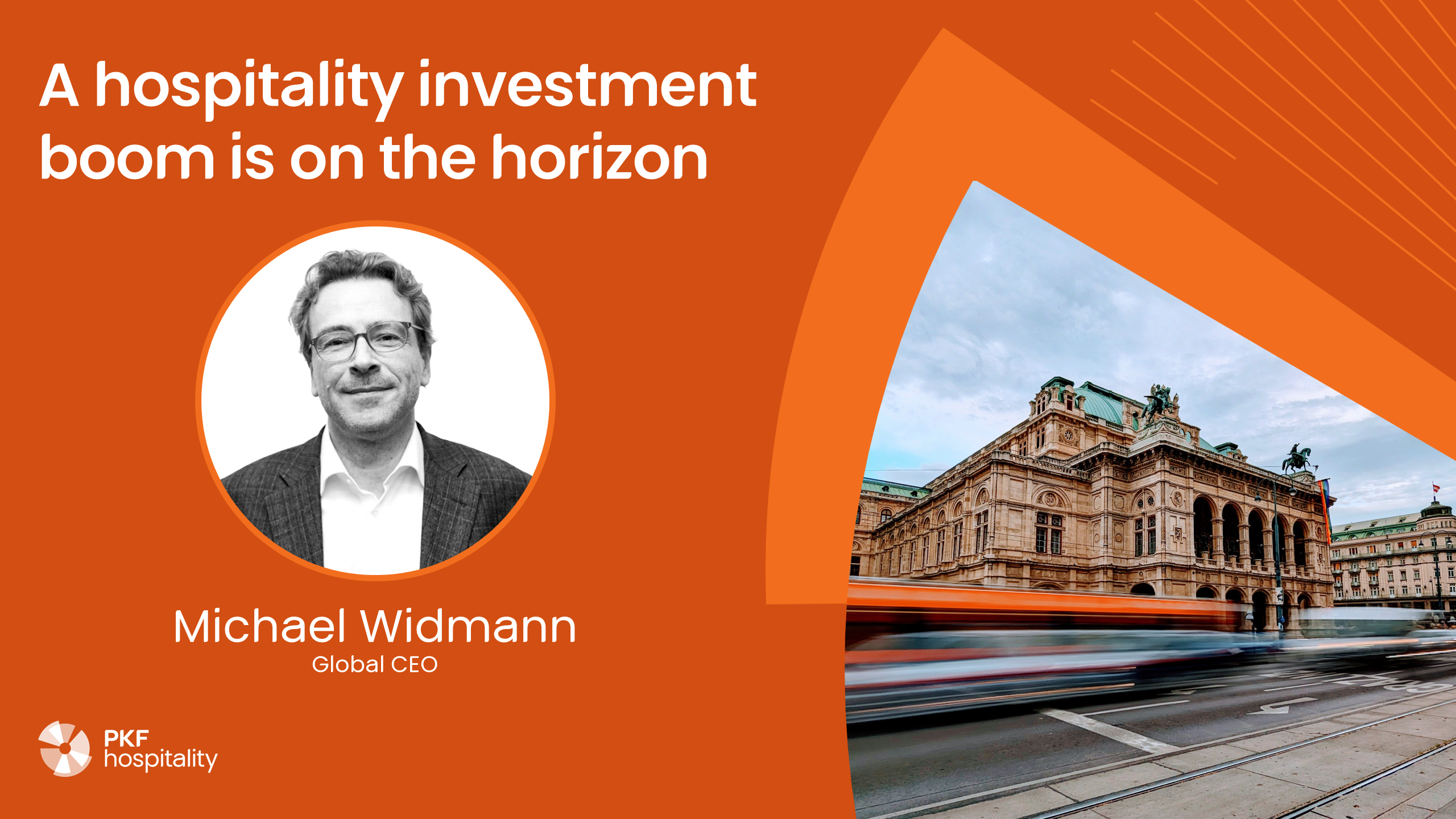What are the main challenges facing the hospitality industry in 2024?

A hospitality investment boom is on the horizon
The background is dramatic: brutal wars in Ukraine and Israel, an economic recession in large parts of the world and a quiet sudden spike of inflation and interest rates in many markets. 2023 closed with a very challenging market environment in many sectors, but notably the real estate sector. Project developers struggle to keep their projects alive – and themselves.
The (operational) hospitality sector, on the other hand, is doing quite well, with many hotels reaching (and some even surpassing) pre-Covid revenue and profitability levels.
So, while the situation in real estate is quite dramatic, we expect a turnaround in the hospitality investment sentiment before the year of 2024 is over. In fact, due to the strong operational results of many individual hotels and hotel groups, we believe that a hospitality investment boom is on the horizon. In short, developers need to survive 2024 – while at the same time laying the groundwork for a strong market resurgence in 2025.

2024 – Opportunities galore … ESG at the forefront
The EU’s Corporate Sustainability Reporting Directive (CSRD) came into effect this year requiring all large companies and listed SMEs that operate in the EU to report on their climate impact and begin publishing regular reports in 2025 for the financial year 2024. This will impact hospitality businesses, their supply chains and their customers and represents a permanent shift in how we run our businesses. ESG performance will increasingly be a determining factor in transactions, property values, and in selecting suppliers, brands and operators. Transparency and better available data will highlight many opportunities for radical improvements in business practices and performance.
With more companies allowing their people to work remotely and reducing business travel as part of carbon reduction plans, 2024 will highlight the importance of MICE travel to allow face to face meetings with teams, suppliers and clients in an efficient and meaningful way. Alternative accommodation and serviced living options will also continue to grow in popularity as the lines between business and leisure trips continue to blur and trips are extended.
2023 saw the return in force of US travellers to top European destinations which helped hoteliers rebuild RevPAR. Despite unpredictable economic and political headwinds in 2024 we expect increased visitation from Asia and China to bolster hotel occupancy rates in gateway European tourism destinations this year. Paris will be the big winner as host city to the 2024 Olympic games, with many intercontinental visitors likely to extend their stays in Europe and make up for lost time!

Key trends shaping the hotel, hospitality, and serviced living sectors
The hospitality industry in 2024 is poised for significant transformation, driven by evolving consumer behaviors and technological advancements. Key trends shaping the hotel, hospitality, and serviced living sectors include:
Innovative Operating Concepts and Emerging Brands: As we look towards 2024, the hospitality industry is seeing a surge in innovative operating concepts, especially in the boutique and lifestyle segments. New brands are emerging, focusing on niche markets and unique guest experiences. These brands are reshaping the traditional hotel model by integrating local culture, personalized services, and sustainable practices into their core values. For example, concepts like co-living and hybrid hotels, which blend residential and transient lodging, are gaining traction. These concepts cater to the increasing demand for longer stays and a blend of work and leisure, particularly appealing to remote workers and digital nomads.
Technological Integration and Experiential Hospitality: The integration of technology in hospitality is advancing rapidly, offering more than just operational efficiency. New brands aim to leverage AI and VR to create immersive booking experiences, while IoT-enabled rooms start to provide personalised comfort and convenience. Automation is not only streamlining operations but also enhancing the guest experience with personalised services. For instance, AI-driven personal assistants and mobile app-based support will start to appear in modern hospitality.
Focus on Sustainability: Sustainability is no longer just a trend but a core element of new hospitality brands. These brands are championing eco-friendly practices, from sourcing local and organic produce for their restaurants to utilizing renewable energy sources. They are not only reducing their environmental footprint but also actively contributing to local communities. This approach is resonating with the growing number of environmentally conscious travelers.
The future of hospitality lies in these innovative brands and concepts that prioritize personalized guest experiences, technological integration and sustainability.

The outlook for 2024 from the US perspective
2024 is a pivotal year for the US as it focuses on its continued recovery from a contracting global economy due to inflation. While the continuing war in Ukraine and the tinderbox that is the Israeli/Palestinian conflict remain at the center of world politics, America balances its active participation in these clashes overseas with an eye towards a presidential election that may change the course of the country.
From the industry perspective, the performance of the hotel and airline sector continues to surpass pre-Covid numbers. The luxury segment has now fully recovered and though inbound international and business travel still lag when compared to 2019 levels, average rates and record profits confirmed that 2023 was another banner year for hospitality.
However, there are dark clouds ahead as revenue growth has slowed significantly and hotel real estate transactions dropped precipitously in the last 12 months. In 2023, a spike in interest rates caused REITS to default on several large hotel investments in major cities, including the Chatwal in New York City and the Hilton Union Square San Francisco. Though it was initially thought that the increase in the cost of financing would primarily impact upscale properties and primary cities, Ashford Hospitality Trust defaulted on a portfolio of 19 hotels primarily consisting of Courtyards, Residence Inns, and Springhill Suites. With an additional 250 billion USD in CMBS loans linked to hospitality real estate coming due in 2024, borrowers, lenders and the cost of capital will dictate what happens next year.
With regard to industry trends, we have seen a consolidation both from the brand and the ownership perspective. The most active participant in M&A was Choice Hotels who completed its acquisition of Radisson Americas in early 2023 and looked to aggressively move to purchase Wyndham. Hyatt acquired the management and assets of the Dream Hotel group and equally important was KSL’s purchase of Hersha Hospitality Trust for $1.4 billion, signaling one of the first signs that REITS are not oblivious to the downturn. We expect this trend to continue as publicly traded companies look to both acquire underperforming assets and realize gains in existing investments in order to mask the downturn in their current portfolio.
2024 is lining up to be a reactive year for the hospitality industry in the US. Operationally, cities who are hosting the myriad of political conventions associated with the upcoming November elections will continue to thrive despite economic headwinds. Glamping, ESG and a move towards more shared, sustainable, and more “natural” projects will continue to be a trend, but much will depend on the results of the presidential race and the opinion of the Federal Reserve Bank. The US economy can thrive when there is little volatility in the market, however, with so much uncertainty around Israel, Ukraine and politics, this upcoming year has great potential but must also reckon with its overdue responsibilities.

Hotel investment market in 2024
The transaction environment in Europe remains challenging due to uncertainties pertaining to financing and pricing of assets. Market participants are shifting their attention to distressed or short-term financing opportunities. Private equity funds – after having been on the sidelines for an extended period of time – will finally get their opportunity to shine. Sourcing of attractive opportunities however, remains highly competitive and the skill set required to be successful is shifting towards the legal and financial structuring edge a buyer brings to the table. It will probably take until Q3 2024 (possibly supported by some easing on the interest rate front) for the market to return to a more supportive environment for 'traditional' buyers and sellers of assets.
Outside of Europe, as so often, the US is ahead in the cycle where anecdotal evidence also points towards a relaxation on the distressed front. However, the systemic risks, likely driven by office real estate, are not over yet and need to be monitored carefully.
In Asia-Pacific, with the notable exception of China where the real estate market is under significant pressure (we are currently assessing the impact of the very sizable capital injection by the Chinese government announced on Jan 24), the situation appears calmer than in Europe or the US. This is partially due to a very different ownership structure (significantly less institutional capital) and the fact that after decades of growth most assets have built a sizeable positive equity buffer. Also, banks are hesitant to enforce capital calls with memories of the Asian Financial Crisis of 1997/1998 still lingering. This is not to say that investors are not struggling with higher interest rates and lower valuations, but based on our current assessment we expect (hospitality) real estate markets to be relatively stable.

Africa, a continent, not a country
When asked for a forecast of what 2024 may bring for Africa I was wondering where to begin. Africa is a continent of 54 independent states, and not as often seen by outsiders, one country. These states could not be more different from one another and their diversity in terms of politics, alignment, industrialisation and level of development varies a lot.
Continued Growth: Africa has seen a steady increase in tourism in recent years. If political stability, economic growth, and infrastructure development continue, it's likely that the tourism sector will experience further expansion. Here we need to single out the recent spate of coups d’etats in West Africa and the continued involvement of private armies like The Wagner Group.
Digital Transformation: The adoption of technology in the tourism and hospitality industry is a global trend. In Africa, this could mean increased use of online booking platforms, mobile applications for travel, and digital marketing strategies to attract international visitors. In fact many tech hubs are establishing themselves on the continent and deliver true innovation.
Infrastructure Development: Investments in infrastructure, such as airports, roads, and hotels, play a crucial role in boosting tourism. Governments and private sectors in various African countries may continue to focus on such developments to make travel more accessible and comfortable. The partially complete highway between Cairo and Cape Town is the most ambitious road network project among many.
Cultural and Ecotourism: The rich cultural and natural diversity of Africa makes it an attractive destination for cultural and ecotourism. Governments and businesses emphasize sustainable and eco-friendly tourism practices to preserve the continent's unique attractions. Africa is in a unique position to make this a very special USP as many destinations are emerging from scratch.
Public Health Considerations: The global COVID-19 pandemic has highlighted the importance of health and safety in the tourism industry. In 2024, the state of public health and the measures in place to manage pandemics or health crises will influence travel decisions and tourism trends.
Regional Collaboration: African countries may continue to work together to promote cross-border tourism and facilitate easier travel within the continent. Initiatives like the African Continental Free Trade Area (AfCFTA) could positively impact tourism. On the flip side visa regimes are still making travel within Africa difficult, for both, African travellers and people from outside of the continent. This has a detrimental effect on tourism relates business. One such issue is the slow reaction in South Africa to granting temporary residence visa to the s called swallows, people escaping the winter I northern countries who often own homes and employ locals etc.
Political Stability: Political stability is crucial for attracting tourists. Countries with stable political environments are more likely to see growth in tourism. On the other hand, political unrest or security concerns can have a negative impact.
When looking at the continent I prefer to look at regions, where appropriate, almost dividing the continent into North, West, East and South.
In hospitality terms it is safe to say that the largest part has reached the benchmark 2019 levels and some destinations have eclipsed those in terms of occupancy and ADR. North Africa, in particular Egypt has recovered well and on a local currency level shot the lights out, which is mainly due to the currency devaluation.
So, what will 2024 bring to these regions? We need to realise the reliance on source markets when looking into the crystal ball. The success of the eastern North African destinations will for the foreseeable future be influenced by the development of the security situation in the region as the threat of the war spreading remains real.
The largest part of the continent is reliant on itself, i.e. domestic and regional business travel. Covid had one effect that was not foreseen, it has promoted domestic tourism like never before and this is continuing, albeit not at the same pace as in the Covid and post Covid period.
Driven by mainly overseas travellers, Europe and the US taking the biggest share, Southern Africa is experiencing a very successful season and so is East Africa. Pent-up demand continues to drive occupancy and rate. Will that continue and will hotels manage to keep increasing rates is a big question. Some players are worried that the answer may well be no, or at best with limitation. Luxury was the segment that has seen the biggest improvements for the past two years and it seemed to continue but rumour has it that this is due to slow somewhat.
When looking at West Africa the tourism sector is much smaller than in the North, East and South. There are pockets of touristic destinations that are trying to create viable options. The powerhouses are Accra and Lagos with other regional capitals increasing their stock bit by bit. But this region is largely driven by business tourism with a bit of bleisure thrown in. It is encouraging to see the emergence of some local brands and properties that are departing from the norm of the typical chain-driven box hotels. But some green shoots have the tendency to grow into impressive and sizeable businesses, watch that space.
2024 will see continued improvements in Africa and the main thrust will come from within as regional and cross continental business will increase continuously.




